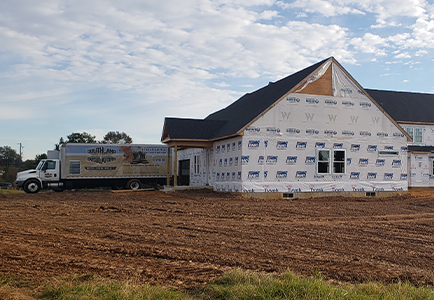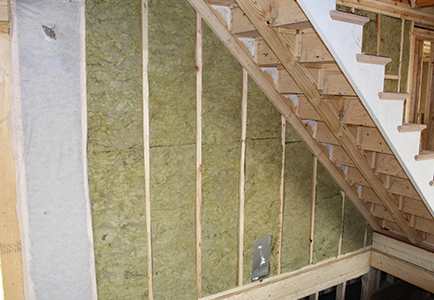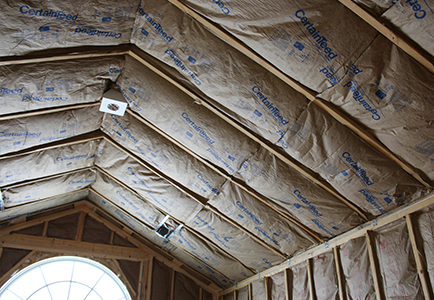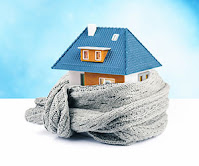Virginia’s humid climate brings real challenges for homeowners. With hot, wet summers and cool, dry winters, your living spaces are constantly working against the weather. These swings in temperature make insulation not just helpful, but necessary.
A properly insulated home acts as a barrier. It helps keep the summer heat out and trap in the warmth during winter. Whether you’re building new or upgrading an older home, quality insulation is one of the smartest ways to boost energy efficiency, comfort, and value. This is especially true here in NOVA, where seasonal extremes can hit hard.
Let’s break down how insulation works, the real-world benefits for homeowners and builders, and why it matters so much in Virginia.

How Insulation Works to Save Energy
Heat always tries to move from warm areas to cool ones. In winter, the warm air in your home wants to escape outside. In summer, the heat from outside pushes into your cooled home. Your heating and cooling system then works harder to keep your home comfortable. It uses more energy and increases your energy bill.
The Science Behind Insulation Performance
Insulation slows down heat transfer using insulation materials rated by R-value. The higher the R-value, the better it resists heat flow. When paired with air sealing, installed insulation creates a thermal barrier that decreases the rate of heat loss in winter and heat gain in summer.
Installation Quality Matters
Even the best insulation materials won’t perform well if installed poorly. Gaps, compression, or missing sections can reduce effectiveness by up to 30%. And if you’re still feeling drafts, the issue might lie in your HVAC system, ductwork, or uninsulated walls. This can be especially true in some of the older homes common in NOVA.
Key Benefits of a Well-Insulated Home or Building
Lower Energy Bills and Savings
When your insulation is doing its job, your heating and cooling system doesn’t have to work as hard. According to federal estimates insulation reduces heating and cooling costs by about 10–20%. Falls Church, VA, right here in NOVA, reports up to 30% savings after home energy upgrades. Over time, your insulation pays for itself thanks to lower energy bills.
Year-Round Comfort (No Drafts or Hot Spots)
Say goodbye to chilly corners in winter and stifling upstairs rooms in summer. A well-air sealed and insulated home keeps your indoor climate steady. You’ll stay cool in the summer and warm in the winter, with fewer uncomfortable drafts. This is especially helpful in NOVA neighborhoods where older homes often lack modern insulation standards.
Reduced HVAC Strain and Maintenance

Insulation helps lessen how often your HVAC system cycles. This extends its life and cuts your maintenance costs over time. Homeowners benefit from fewer surprise breakdowns and service calls. And it enables builders to use smaller, more efficient HVAC systems in well-insulated homes.
Noise Reduction
Another perk is reduced noise. Insulation helps quiet outside sounds like traffic or construction and even cuts noise between rooms. This is a major benefit and selling point for homes in Northern Virginia’s growing urban and suburban areas.
Healthier Indoor Environment
When you seal air leaks and add insulation to your home they help control the infiltration of dust, pollen, and outdoor pollutants. This gives you better control over your home’s indoor air quality and humidity. It also helps improve moisture control. Less moisture reduces the risk of mold and creates a healthier home, especially for people with allergies. It’s even been noted by Falls Church, VA that these energy upgrades help create a “healthier, well-ventilated living environment.”
Environmental Benefits (Lower Emissions)
Lowering your home’s energy consumption means a reduced demand on power plants. This reduced demand lowers greenhouse gas emissions and reduces your home’s carbon footprint. Our state’s electricity grid still partially relies on fossil fuels, so this is a big win for our community and our environment. For builders, choosing to build “green” is a plus that supports Energy Star homes and environmental standards.
Increased Home Value and Marketability
Energy upgrades like insulation and air sealing add value to your home. Today’s buyers care about comfort and energy efficiency. And they are very aware of rising utility costs. A home that costs less to operate stands out in the market. In competitive NOVA real estate, that’s a serious edge for both homeowners and builders.
Improved Building Durability
Proper insulation and air sealing help protect your home’s structure. They work to reduce condensation in your walls and ceilings and help prevent costly repairs from moisture damage and rot. Some types of insulation, such as closed-cell spray foam provide a built-in vapor barrier to help keep moisture out. In winter, insulation and air sealing help prevent ice dams on your roof by reducing how much heat escapes. Your house will last longer when it has less damage from moisture and temperature extremes.
Compliance with Modern Building Codes
It’s important that new homes in Virginia meet state building code requirements. Meeting or exceeding these codes helps protect your investment and ensure inspection success. It also “future-proofs” your home from rising code standards. Code requirements are based on climate zones and most of NOVA falls in climate zone 4. (Small portions of our state fall in climate zones 3 or 5.)
Virginia’s current building code requires R-60 for ceiling insulation and R-13 to R-15 for walls in zone 4, plus air sealing and duct requirements. Always verify the most current requirements with a professional.

Insulation in Virginia: Climate Considerations, Codes, and Incentives
Virginia’s Unique Climate Challenges and Building Code Updates
Climate zone 4’s mixed humid climate means we require both heating and cooling for much of the year. Our chilly winters and hot, humid summers force our insulation to do double duty. This makes good insulation even more critical. Yet many older homes here in NOVA are under insulated and still don’t meet current code requirements.
Virginia’s current statewide building code was adopted in January of 2024 with state-specific amendments. It was updated to align with the modern efficiency standards of the 2021 International Energy Conservation Code (IECC). Following this code ensures your home is up-to-date and energy efficient.
Why Choose Southland Insulators?
Southland Insulators has been helping homeowners and builders throughout NOVA and the entire state of Virginia stay comfortable by saving energy since 1986. We’re Virginia’s largest independent insulation contractor and have a deep knowledge of our region’s unique climate and construction needs. We have the local expertise you need for your project.
We offer a full range of energy efficiency solutions, from fiberglass and spray foam to rigid foam board and air sealing. Our experienced team ensures quality installation, so your home gets the full benefit of modern insulation technology.
Get the Comfort and Savings You Deserve
Proper insulation is one of the most cost-effective ways to improve your home. It saves money, boosts comfort, protects your investment, and supports a healthier living environment. Combined with air sealing, your home will stay cozy in the winter and cool in the summer.
Let our expert team help make your NOVA home or home project more comfortable and efficient, all year round. Contact us today to schedule a free estimate.
References
City of Falls Church. (n.d.). Home energy audits. https://fallschurchva.gov/2291/Home-Energy-Audits
Energy Star. (n.d.). Recommended Home Insulation R-Values. https://www.energystar.gov/saveathome/seal_insulate/identify-problems-you-want-fix/diy-checks-inspections/insulation-r-values
Energy Star. (n.d.). Why seal and insulate. https://www.energystar.gov/saveathome/seal_insulate/why-seal-and-insulate
Focus on Energy. (n.d.). 5 benefits of home insulation. https://focusonenergy.com/blog/5-benefits-of-home-insulation
George Mason University. (n.d.). Virginia climatology. Virginia Climate. https://www.vaclimate.gmu.edu/climatology
ICC Digital Codes. (n.d.). 2021 International Energy Conservation Code. https://codes.iccsafe.org/content/IECC2021V1.0/chapter-4-re-residential-energy-efficiency#IECC2021V1.0_RE_Ch04_SecR402.2
ICC Digital Codes. (n.d.). 2021 Virginia Residential Code. https://codes.iccsafe.org/content/VARC2021P1/chapter-11-re-energy-efficiency
Insulation Institute. (2021). Virginia 2021 building code summary. https://insulationinstitute.org/wp-content/uploads/2025/05/N149-VA-Energy-Code-0425.pdf
Insulation Institute. (n.d.). Why insulate: Residential professionals guide. https://insulationinstitute.org/im-a-building-or-facility-professional/residential/why-insulate/
Insulation.org. (n.d.). Benefits of insulation. https://insulation.org/about-insulation/benefits-of-insulation/
U.S. Department of Energy. (n.d.). Guide to home insulation. https://www.energy.gov/sites/prod/files/guide_to_home_insulation.pdf
U.S. Department of Energy. (n.d.). Insulation. Energy Saver. https://www.energy.gov/energysaver/insulation
U.S. Department of Energy. (n.d.). Whole-house systems approach. Energy Saver. https://www.energy.gov/energysaver/whole-house-systems
Virginia Department of Energy. (n.d.). Home energy rebates frequently asked questions. https://www.energy.virginia.gov/energy-efficiency/HomeEnergyRebatesFrequentlyAskedQuestions.shtml
Virginia Department of Housing and Community Development. (n.d.). Weatherization Assistance Program (WAP). https://www.dhcd.virginia.gov/wx
Virginia Cooperative Extension. (n.d.). Is your house too cold even with attic insulation? (Publication BSE-293). Virginia Tech. https://www.pubs.ext.vt.edu/content/dam/pubs_ext_vt_edu/2901/2901-9006/BSE-293.pdf

